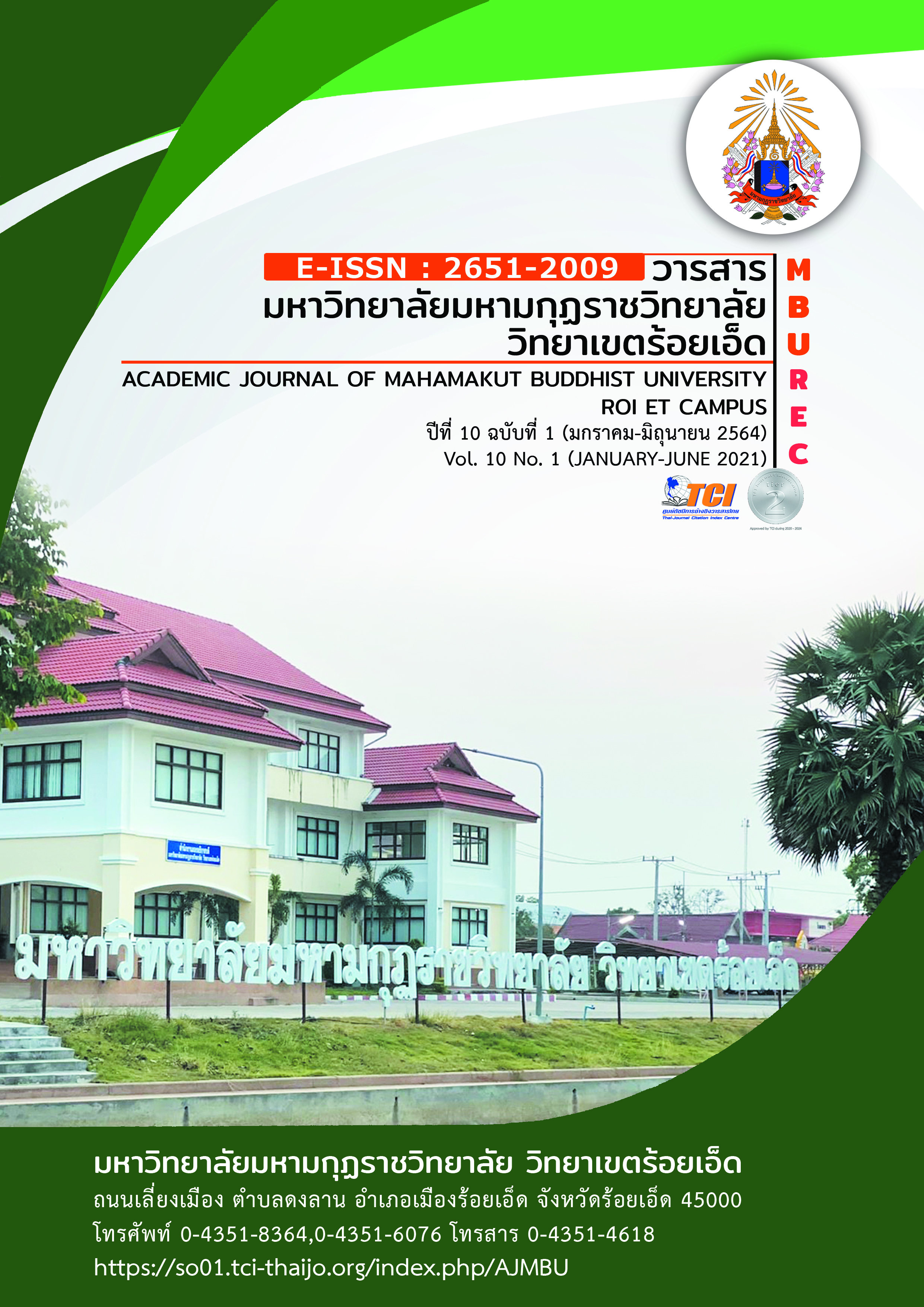Problems of Judicial Review in the Model of Democracy under the Thai Constitution B.E. 2560
Main Article Content
Abstract
This academic article aim to study the problem of the judicial review in a democratic model. Both in term of process and content. The results showed that the problem of judicial review power in a procedural democratic model is use of the majority in the exercise of decision power in opposition to the majority of the people in expressing their intention to draft a law in accordance with the Constitution, 2017, Article 77, which advocates for the deficiencies of the majority, both procedural imperfections. Lack of participation and equality in terms of content the legislature’s intentions do not match the views of the Thai people and the rights of the people, neglect the rights of minorities to lead. It is defined as the role of the judiciary in considering amendments. Therefore, it is seen that proceedings are mainly based on the opinion of the judges. Without considering the views of other groups.
Article Details
References
เกรียงศักดิ์ เชษฐพัฒนวนิช. (2536). แนวความคิดประชาธิปไตยแบบไทย. กรุงเทพมหานคร : สำนักพิมพ์มหาวิทยาลัยธรรมศาสตร์.
เกษม เพ็ญภินันท์. (2550). รัฐประหารเพื่อประชาธิปไตยอันมีพระมหากษัตริย์ทรงเป็นประมุข: การเมืองน้ำเชี่ยว: รัฐประการ 19 กันยายน 2549 กับปัญหาความชอบธรรมทางการเมือง. กรุงเทพมหานคร : สำนักพิมพ์ฟ้าเดียวกัน.
เควิน ฮิววิสัน (Kevin Hewison). (2552). ประชาธิปไตยแบบไทยๆ : การต่อสู้ของอนุรักษนิยมในการเมืองไทย (Thai-Style Democracy : A Conservative Struggle for Thailand’s Politics). คณะรัฐศาสตร์ : จุฬาลงกรณ์มหาวิทยาลัย.
ฉันชาย โรจนสโรช. (2553). ความคุ้มกันของผู้พิพากษาในประเทศสหรัฐอเมริกา. วารสารนิติศาสตร์ มหาวิทยาลัยอัสสัมชัญ. 1(1). 114-126.
ชนะศึก วิเศษชัย. (2562). กระบวนการได้มาซึ่งตุลาการกับการส่งเสริมความชอบธรรมของศาลรัฐธรรมนูญ. วารสารมหาจุฬานาครทรรศน์. 7(11). 105-116.
ไชยันต์ ไชยพร. (2551). ยังมีทางเดินไปข้างหน้าอีกไหม ตามระบอบประชาธิปไตย. คณะรัฐศาสตร์ : จุฬาลงกรณ์มหาวิทยาลัย.
ทิพภานิดา ปาลกะวงศ์. (2556). ความชอบธรรมของศาลรัฐธรรมนูญในระบบการเมืองไทย.ดุษฎีนิพนธ์ปรัชญาดุษฎีบัณฑิต สาขาการเมือง. มหาวิทยาลัยรามคำแหง.
ทักษ์ เฉลิมเตียรณ. (2548). การเมืองระบบพ่อขุนอุปถัมภ์แบบเผด็จการ. พิมพ์ครั้งที่ 2. กรุงเทพมหานคร : มูลนิธิโครงการตำราสังคมศาสตร์และมนุษยศาสตร์.
นรนิติ เศรษฐบุตร. (2550). รัฐธรรมนูญกับการเมืองไทย. พิมพ์ครั้งที่ 2. กรุงเทพมหานคร : มหาวิทยาลัยธรรมศาสตร์.
วิชา มหาคุณ. (2552). สาราบุกรมรัฐธรรมนูญแห่งราชอาณาจักรไทย พุทธศักราช 2550: เรื่องคณะกรรมการป้องกันและปราบปรามการทุจริตแห่งชาติ (ป.ป.ช.). นนทบุรี : วิทยาลัยการเมืองการปกครอง.
วิรัช วิรัชนิภาวรรณ และคณะ. (2547). การวิเคราะห์คำวินิจฉัยของศาลและตุลาการศาลรัฐธรรมนูญ เล่มที่ 3 ส่วนที่ 3. กรุงเทพมหานคร : นิติธรรม.
วิษณุ เครืองาม. (2523). กฎหมายรัฐธรรมนูญ. พิมพ์ครั้งที่ 1. กรุงเทพมหานคร : สำนักพิมพ์นิติบรรณาการ.
วิสาข์ อิ่มใจ. (2551). ปัญหาว่าด้วยโครงสร้างและอำนาจหน้าที่ของศาลรัฐธรรมนูญ: ศึกษาเปรียบเทียบศาลรัฐธรรมนูญตามบัญญัติของรัฐธรรมนูญฯ พุทธศักราช 2540 และรัฐธรรมนูญฯ 2550. วิทยานิพนธ์นิติศาสตรมหาบัณฑิต สาขานิติศาสตร์. จุฬาลงกรณ์มหาวิทยาลัย.
ศักดิ์ชัย แก้วสีดา. (2560). แนวทางการส่งเสริมประสิทธิภาพการบริหารงานตามหลักธรรมาภิบาลขององค์การบริหารส่วนตำบลในอำเภอบ้านกรวด จังหวัดบุรีรัมย์. วารสารการบริหารการปกครองและนวัตกรรมท้องถิ่น. 1(3). 40-47.
George Mace. (1972). The antidemocratic character of judicial review. California Law Review. 60(4). 1140-1144.
Krishanti Vignarajah. (2010). The Political Roots of Judicial Legitimacy : Explaining the Enduring Validity of the Insular Cases. The University of Chicago Law Review. 77. 782-845.
Kuhonta et al. (2014). Democratic Regression in Thailand: The Ambivalent Role of Civil Society and Political Institutions. Journal of International and Strategic Affairs. 36(3). 333-355.
Leonardo Morlino, (2002). What is a “Good” Democracy? Theory and Empirical Analysis, inference on “The European Union, Nations State, and the Quality of Democracy. Lthem Europe,”. University of California, Berkeley.
Robert Post. (1998). Democracy, Popular Sovereignty and Judicial Review. California Law Reviews. 86. 429-443.
Saikrishna B. Prakash and John C. Yoo. (2003). The Origins of Judicial Review. University of Chicago Law Review. 70. 2989-2995.
Tom Ginsburg. (2012). Courts and New Democracies : Recent Works. Public Law and Legal Theory Working Paper. 63(10). 9-139.
Walter Dellinger. (1983). The legitimacy of constitutional change: Rethinking the amendment process. Harvard Law Review. 97. 386-432.
William Michael Treanor. (2007). Process theory : Majoritarian and the original understanding. Fordham Law Review. 75. 2989-2995.


